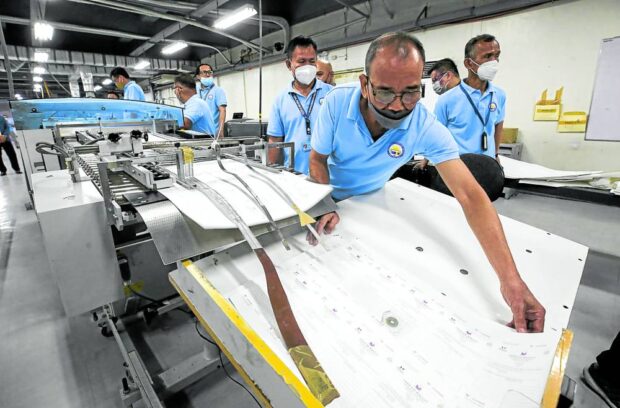Local poll execs can now reject village, SK bets on the spot

FINALLY HAPPENING Sample ballots for the barangay and Sangguniang Kabataan elections are printed during a media tour of the National Printing Office, Diliman, Quezon City, in this photo taken on Sept. 29, 2022. The elections have been repeatedly postponed. —LYN RILLON
For the first time, Commission on Elections (Comelec) field offices will reject outright aspiring candidates for the Oct. 30 barangay and Sangguniang Kabataan (SK) elections who are either overaged, underaged, or not registered voters.
The Comelec is expected to issue the new rule before the start of the Aug. 28-Sept. 2 filing of certificates of candidacy (COCs).
“For those who want to be SK candidates who will be more than 24 years of age on Election Day, we are making it clear that we won’t accept their COCs,” Comelec chair George Garcia warned.
“For those who will run for barangay posts, once we see that they are not registered to vote in the barangay where they are seeking to run, don’t even attempt to file a COC because we will not accept it,” he said. “They can go to the courts [but] we won’t accept their COCs.”
With the new rule, the Comelec will avoid having to act on thousands of cases to cancel the COCs of persons who should not have filed their candidacies in the first place.
Article continues after this advertisement“Yes, this will be a new process because in the past it’s just ministerial; all COCs are received without checking whether the person is a registered voter or overage and underage,” said Comelec spokesperson Rex Laudiangco.
Article continues after this advertisement“We want to avoid a repeat of that scenario in the 2018 barangay elections where we filed around 6,000 special action cases to cancel COCs mostly against youths who were overage because they filed a COC even if they would be more than 24 years in age by Election Day,” he added.
Laudiangco said the aspiring candidate’s age could be easily checked from the COC itself and the voter registration status could be verified in the Comelec database.
He said that in most cases, past offenders were simply mistaken about the age requirement and had no malicious intent to deceive voters.
Lengthy process
Laudiangco also pointed out that the cancellation of COCs involved a lengthy legal process since such cases were decided by a Comelec division.
The Comelec has only two divisions composed of three commissioners each.
Laudiangco said some decisions from the last barangay and SK elections in 2018 only became final recently, about five years later.
For the barangay and SK elections, the period for filing COCs in at least 42,000 barangays nationwide is from Aug. 28 to Sept. 2. The campaign period officially starts on Oct. 19.
All candidates have to be registered voters in the barangay where they seek to run for office.
Barangay and SK candidates have to be at least 18 years old on Election Day, but SK candidates should not be more than 24 years old then.
Under the law, a candidate for the barangay council must be a Filipino citizen who is able to read and write; a registered voter in the barangay where he intends to be elected; and a resident there for at least one year immediately preceding the day of the election.
‘Antidynasty provision’
The same qualifications are required of the SK candidates, with the additional condition that they must not be more than 24 years old on the day of the elections.
They also must not be related within the second civil degree of consanguinity or affinity to any incumbent elected national official or to any incumbent elected local official in the barangay where they seek to run. This is the “antidynasty provision” of the SK reform law introduced by President Marcos when he was a senator in 2015.
There are around 670,000 barangay council and SK members who have been holding office for nearly five years now after several elections were postponed since the last one held in 2018.
Postponements
In October 2022, Mr. Marcos signed Republic Act No. 11935, which moved the next barangay and SK elections to the last Monday of October 2023, and every three thereafter.
He pointed out that repeated postponement of barangay and SK polls “merely underlies the unfinished business of deeper issues plaguing both the barangay and Sangguniang Kabataan systems.”
In December 2019, then President Rodrigo Duterte signed RA 11462 moving the barangay and SK elections from May 2020 to the first Monday of December 2022.
Duterte had urged Congress in his State of the Nation Address that year, to postpone the polls to rectify the truncated terms of the officials only elected on May 14, 2018.
It was the third postponement under Duterte’s administration.
Prior to the May 2018 elections, Congress postponed the barangay and SK elections twice, from Oct. 31, 2016, to Oct. 23, 2017, and then to May 14, 2018.
Duterte deferred the 2016 elections because he feared drug money may be used to fund the campaigns of some candidates.
—WITH A REPORT FROM INQUIRER RESEARCH
READ: Comelec: COC filing for Barangay and SK polls pushed to August